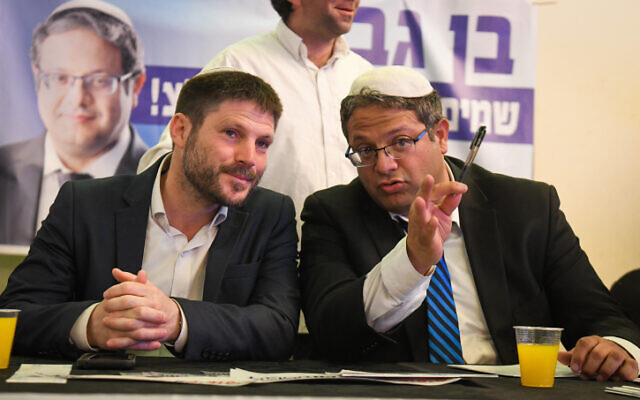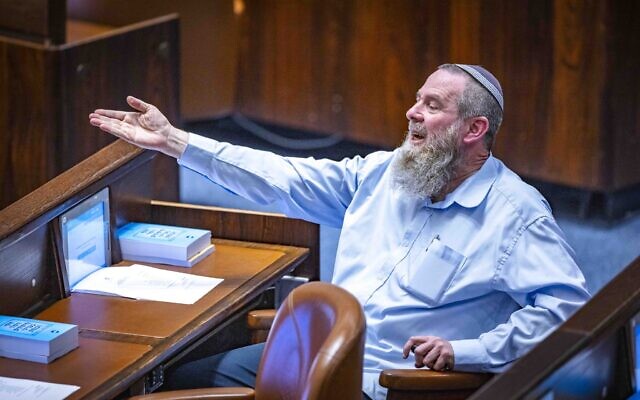Outgoing Transportation Minister Merav Michaeli on Monday charged that recent violence in the country can be directly tied to violence in the West Bank and the rise of the far right in politics.
“A straight line connects the violence against Arabs and against human rights activists in Hebron — and the violence that Israeli citizens suffer in the streets,” Michaeli said at a faction meeting of her Labor party, referring to a number of violent incidents in the West Bank city and several cases of road rage in Israel.
“When the country is taken over and is in the hands of extremists who all say, ‘We’re the bosses here’ and ‘We can do anything we want’; when Arabs, leftists, human rights activists are labeled as the enemy; when anything justifies brandishing a gun — it means that anyone who is not ‘like us,’ anyone who is not ‘us’ can be beaten up, can be hit, should be expelled,” Michaeli said.
The center-left party leader was alluding to extremist Otzma Yehudit chief Itamar Ben Gvir, who campaigned on the slogan, “We are the bosses” in Israel (seen to be implying Jews — and not Arabs), and who has called left-wing activists “anarchists.”
Ben Gvir, who is in line to become police minister in the prospective right-wing government, has faced scrutiny for drawing his gun on several occasions over the past year, including last December, when he waved a pistol during an argument with Arab parking attendants in Tel Aviv who told him to remove his vehicle from a prohibited spot.
Get The Times of Israel's Daily Edition by email and never miss our top stories
Along with Ben Gvir, Michaeli also hit out at his far-right allies, Religious Zionism leader Bezalel Smotrich and MK Avi Maoz of the anti-LGBT Noam faction.
Noam, according to Michaeli, “is entirely based on hatred and exclusion, hatred of gays and lesbians, hatred of Arabs, exclusion of women.”

Then-Otzma Yehudit party member Itamar Ben Gvir (R) speaks with then-head of the National Union party MK Betzalel Smotrich seen during an elections campaign event of Otzma Yehudit party in Bat Yam, April 6, 2019. (Flash90)
“And that’s even before we get into the difficult questions about the sexual harassment stories surrounding its spiritual leader,” she added, referring to Rabbi Zvi Tau, who has been accused of rape.
Maoz, whose one-seat party advocates for heteronormative family structures, has said that he wants to reinstate controversial conversion therapy and to advance legislation banning pride parades.
Speaking during a faction meeting Monday, Maoz — who is due to be in charge of “Jewish identity” in the government that presumed prime minister-to be Benjamin Netanyahu is working to form — refused to say whether he has concrete plans to advance against Israel’s LGBT community.

MK Avi Maoz attends a discussion in the Knesset,on November 22, 2022. (Olivier Fitoussi/Flash90)
Michaeli argued that “without a liberal vision” to counter the far-right, LGBT Israelis and those not considered Jewish under Orthodox law will face discrimination.
“Without a civil vision there will be no equality of rights for women, for Arab citizens, for immigrants according to the Law of Return,” she said.
Before splitting into separate factions, Religious Zionism, Otzma Yehudit, and Noam ran on a joint slate in the November 1 election, in which Netanyahu’s right-religious bloc won a majority of Knesset seats.
As in several of the previous four elections since April 2019, Netanyahu helped broker the far-right alliance to boost his bloc’s prospects of taking power.
Michaeli charged that such political expediency was responsible for mainstreaming the far-right ideologies of Netanyahu’s allies and elevating them in the likely new government.
“For years, these parties, these people, these bad apples were out of bounds. Even within right-wing circles, they were outside the camp. Now, these hateful and exclusionary parties are welcomed with a warm embrace by Benjamin Netanyahu,” she said.
The factions in Netanyahu’s bloc — which also include his right-wing Likud party and the ultra-Orthodox — have several areas of policy agreement, chief among them plans that would drastically curb judicial authority.
Critics, including Michaeli, have claimed the proposed legal reforms could lead to the dismissal of Netanyahu’s ongoing trial on corruption charges, in which he denies wrongdoing.
“Everything is kosher in his attempt to escape from the trial,” she said. “This is how extremist elements take control of the country.”


